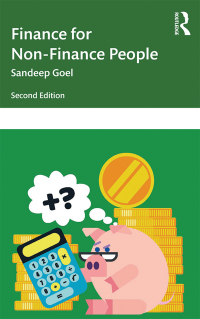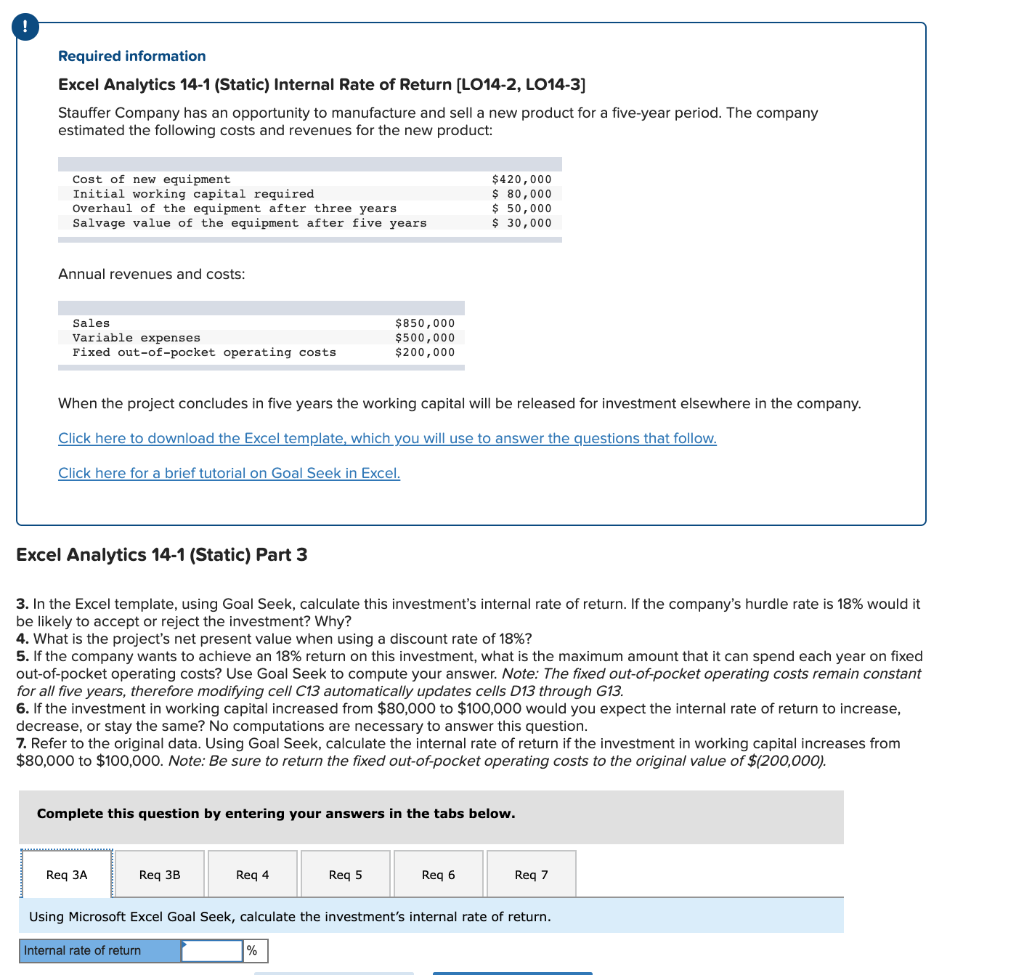
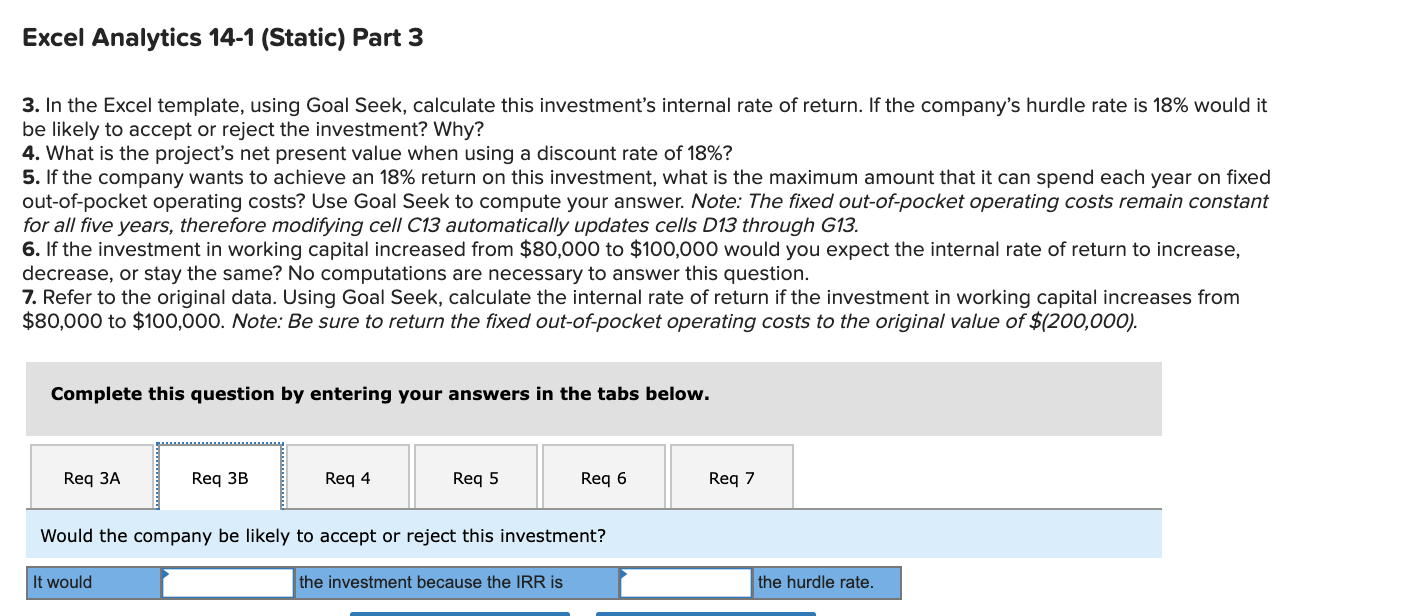
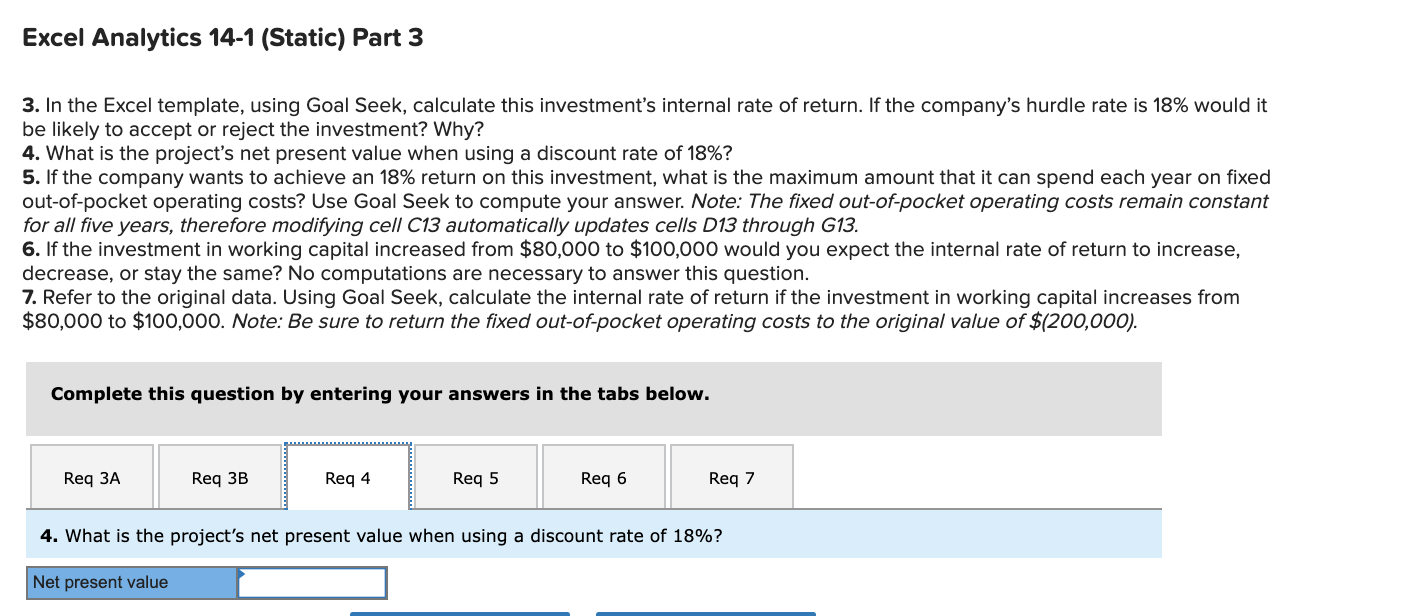
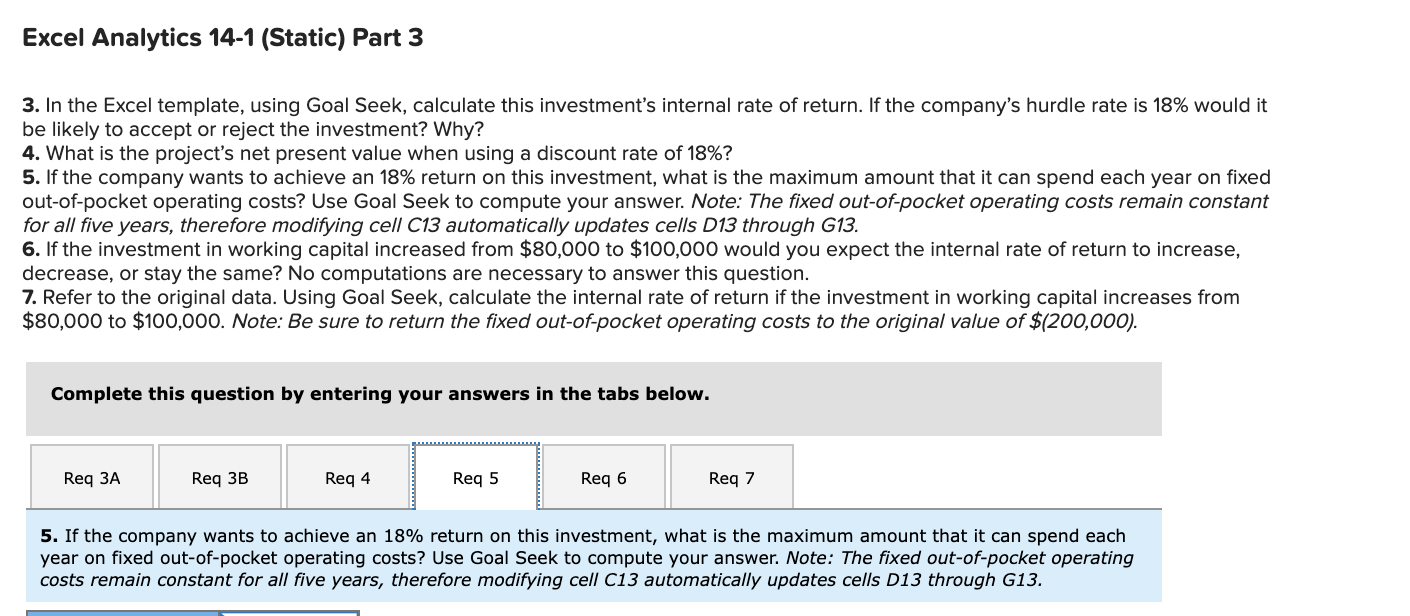
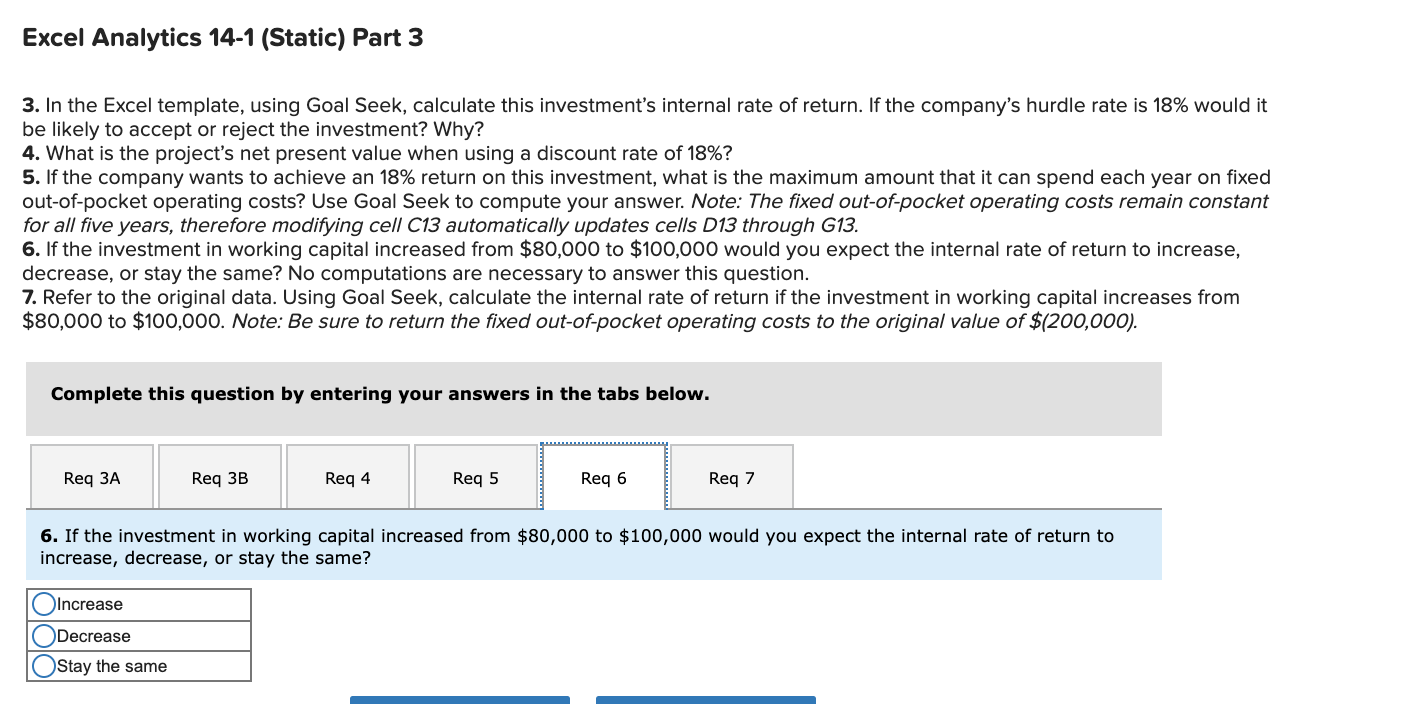
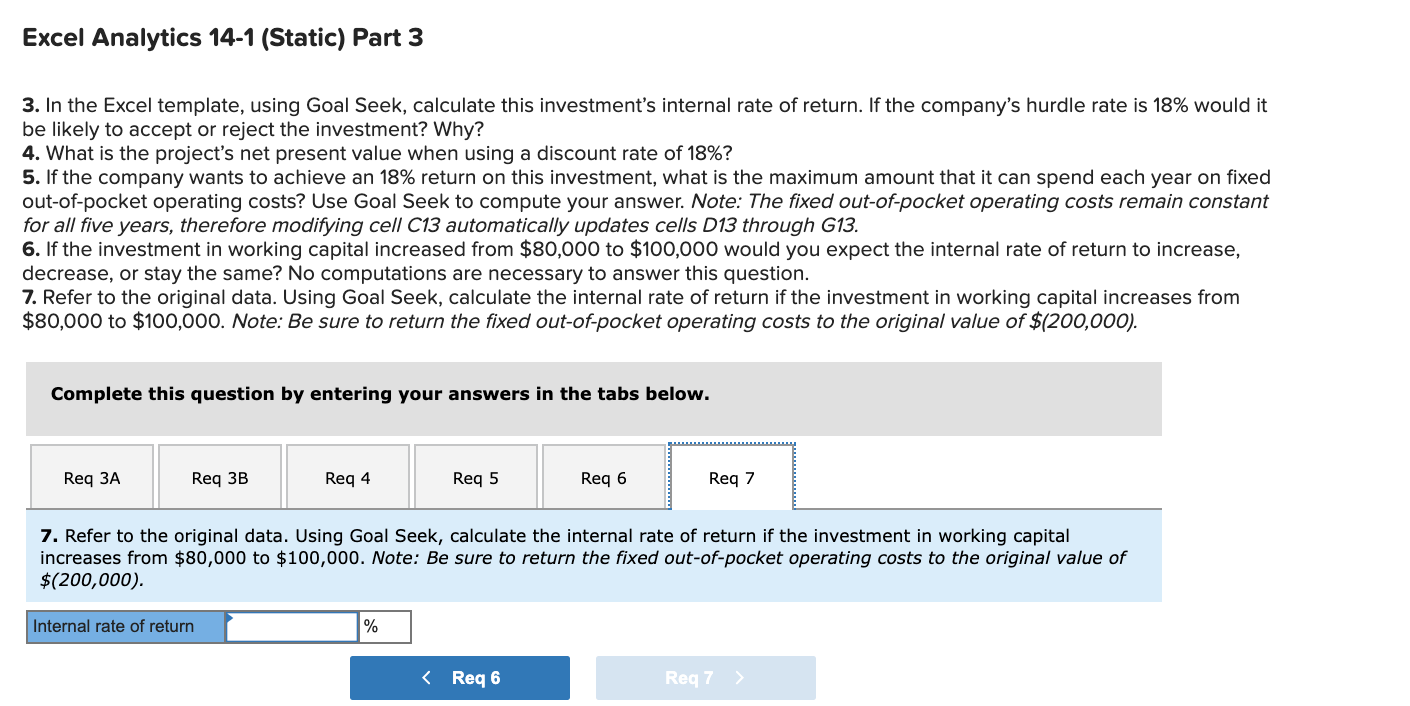
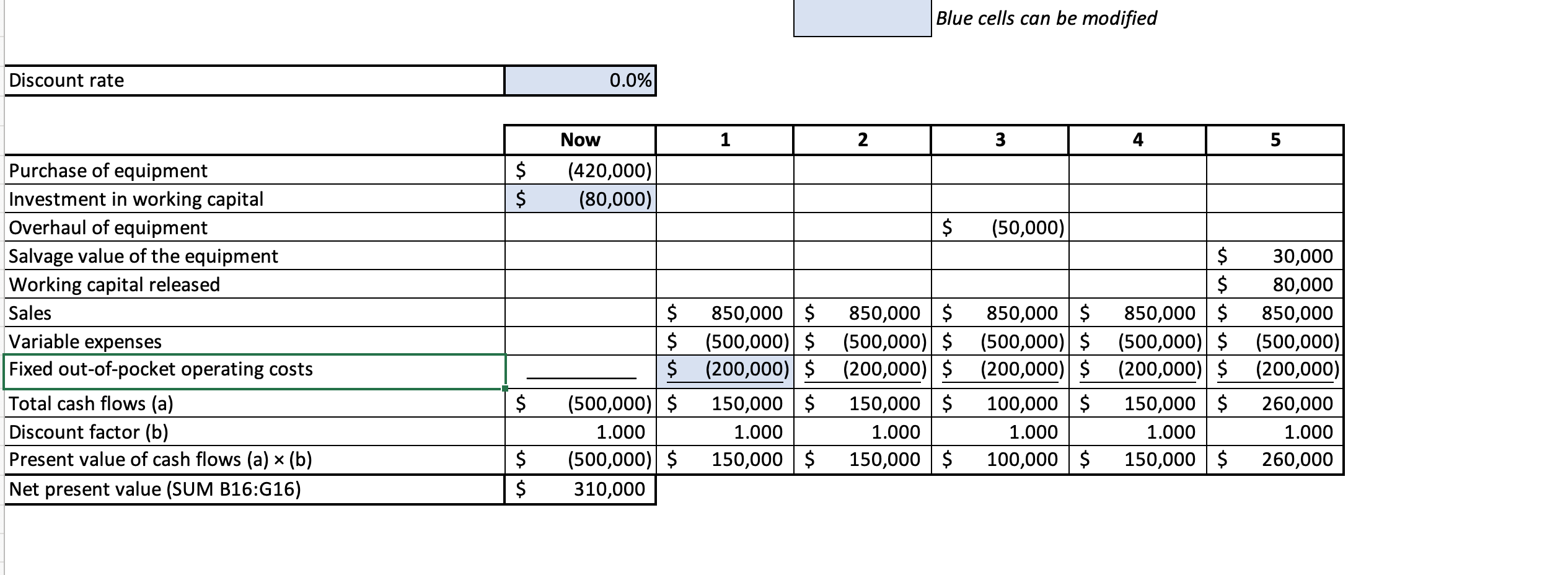 Excel Analytics 14-1 (Static) Internal Rate of Return [LO14-2, LO14-3]
Excel Analytics 14-1 (Static) Internal Rate of Return [LO14-2, LO14-3]
Required information Excel Analytics 14-1 (Static) Internal Rate of Return (LO14-2, LO14-3] Stauffer Company has an opportunity to manufacture and sell a new product for a five-year period. The company estimated the following costs and revenues for the new product: Cost of new equipment Initial working capital required Overhaul of the equipment after three years Salvage value of the equipment after five years $420,000 $ 80,000 $ 50,000 $ 30,000 Annual revenues and costs: Sales Variable expenses Fixed out-of-pocket operating costs $850,000 $500,000 $200,000 When the project concludes in five years the working capital will be released for investment elsewhere in the company. Click here to download the Excel template, which you will use to answer the questions that follow. Click here for a brief tutorial on Goal Seek in Excel. Excel Analytics 14-1 (Static) Part 3 3. In the Excel template, using Goal Seek, calculate this investment's internal rate of return. If the company's hurdle rate is 18% would it be likely to accept or reject the investment? Why? 4. What is the project's net present value when using a discount rate of 18%? 5. If the company wants to achieve an 18% return on this investment, what is the maximum amount that it can spend each year on fixed out-of-pocket operating costs? Use Goal Seek to compute your answer. Note: The fixed out-of-pocket operating costs remain constant for all five years, therefore modifying cell C13 automatically updates cells D13 through G13. 6. If the investment in working capital increased from $80,000 to $100,000 would you expect the internal rate of return to increase, decrease, or stay the same? No computations are necessary to answer this question. 7. Refer to the original data. Using Goal Seek, calculate the internal rate of return if the investment in working capital increases from $80,000 to $100,000. Note: Be sure to return the fixed out-of-pocket operating costs to the original value of $(200,000). Complete this question by entering your answers in the tabs below. Req Reg 3B Reg 4 Reg Reg 6 Using Microsoft Excel Goal Seek, calculate the investment's internal rate of return. Internal rate of return Excel Analytics 14-1 (Static) Part 3 3. In the Excel template, using Goal Seek, calculate this investment's internal rate of return. If the company's hurdle rate is 18% would it be likely to accept or reject the investment? Why? 4. What is the project's net present value when using a discount rate of 18%? 5. If the company wants to achieve an 18% return on this investment, what is the maximum amount that it can spend each year on fixed out-of-pocket operating costs? Use Goal Seek to compute your answer. Note: The fixed out-of-pocket operating costs remain constant for all five years, therefore modifying cell C13 automatically updates cells D13 through G13. 6. If the investment in working capital increased from $80,000 to $100,000 would you expect the internal rate of return to increase, decrease, or stay the same? No computations are necessary to answer this question. 7. Refer to the original data. Using Goal Seek, calculate the internal rate of return if the investment in working capital increases from $80,000 to $100,000. Note: Be sure to return the fixed out-of-pocket operating costs to the original value of $(200,000). Complete this question by entering your answers in the tabs below. Req Req 3B Req 4 Reg 5 Req 6 Req 7 Would the company be likely to accept or reject this investment? It would the investment because the IRR is the hurdle rate. Excel Analytics 14-1 (Static) Part 3 3. In the Excel template, using Goal Seek, calculate this investment's internal rate of return. If the company's hurdle rate is 18% would it be likely to accept or reject the investment? Why? 4. What is the project's net present value when using a discount rate of 18%? 5. If the company wants to achieve an 18% return on this investment, what is the maximum amount that it can spend each year on fixed out-of-pocket operating costs? Use Goal Seek to compute your answer. Note: The fixed out-of-pocket operating costs remain constant for all five years, therefore modifying cell C13 automatically updates cells D13 through G13. 6. If the investment in working capital increased from $80,000 to $100,000 would you expect the internal rate of return to increase, decrease, or stay the same? No computations are necessary to answer this question. 7. Refer to the original data. Using Goal Seek, calculate the internal rate of return if the investment in working capital increases from $80,000 to $100,000. Note: Be sure to return the fixed out-of-pocket operating costs to the original value of $(200,000). Complete this question by entering your answers in the tabs below. Req Reg 3B Req 4 Reg 5 Reg 6 Req 7 4. What is the project's net present value when using a discount rate of 18%? Net present value Excel Analytics 14-1 (Static) Part 3 3. In the Excel template, using Goal Seek, calculate this investment's internal rate of return. If the company's hurdle rate is 18% would it be likely to accept or reject the investment? Why? 4. What is the project's net present value when using a discount rate of 18%? 5. If the company wants to achieve an 18% return on this investment, what is the maximum amount that it can spend each year on fixed out-of-pocket operating costs? Use Goal Seek to compute your answer. Note: The fixed out-of-pocket operating costs remain constant for all five years, therefore modifying cell C13 automatically updates cells D13 through G13. 6. If the investment in working capital increased from $80,000 to $100,000 would you expect the internal rate of return to increase, decrease, or stay the same? No computations are necessary to answer this question. 7. Refer to the original data. Using Goal Seek, calculate the internal rate of return if the investment in working capital increases from $80,000 to $100,000. Note: Be sure to return the fixed out-of-pocket operating costs to the original value of $(200,000). Complete this question by entering your answers in the tabs below. Req Reg 3B Reg 4 Req 5 Reg 6 Reg 7 5. If the company wants to achieve an 18% return on this investment, what is the maximum amount that it can spend each year on fixed out-of-pocket operating costs? Use Goal Seek to compute your answer. Note: The fixed out-of-pocket operating costs remain constant for all five years, therefore modifying cell C13 automatically updates cells D13 through G13. Excel Analytics 14-1 (Static) Part 3 3. In the Excel template, using Goal Seek, calculate this investment's internal rate of return. If the company's hurdle rate is 18% would it be likely to accept or reject the investment? Why? 4. What is the project's net present value when using a discount rate of 18%? 5. If the company wants to achieve an 18% return on this investment, what is the maximum amount that it can spend each year on fixed out-of-pocket operating costs? Use Goal Seek to compute your answer. Note: The fixed out-of-pocket operating costs remain constant for all five years, therefore modifying cell C13 automatically updates cells D13 through G13. 6. If the investment in working capital increased from $80,000 to $100,000 would you expect the internal rate of return to increase, decrease, or stay the same? No computations are necessary to answer this question. 7. Refer to the original data. Using Goal Seek, calculate the internal rate of return if the investment in working capital increases from $80,000 to $100,000. Note: Be sure to return the fixed out-of-pocket operating costs to the original value of $(200,000). Complete this question by entering your answers in the tabs below. Req Req 3B Req 4 Reg 5 Reg 6 Req 7 6. If the investment in working capital increased from $80,000 to $100,000 would you expect the internal rate of return to increase, decrease, or stay the same? Increase Decrease Stay the same Excel Analytics 14-1 (Static) Part 3 3. In the Excel template, using Goal Seek, calculate this investment's internal rate of return. If the company's hurdle rate is 18% would it be likely to accept or reject the investment? Why? 4. What is the project's net present value when using a discount rate of 18%? 5. If the company wants to achieve an 18% return on this investment, what is the maximum amount that it can spend each year on fixed out-of-pocket operating costs? Use Goal Seek to compute your answer. Note: The fixed out-of-pocket operating costs remain constant for all five years, therefore modifying cell C13 automatically updates cells D13 through G13. 6. If the investment in working capital increased from $80,000 to $100,000 would you expect the internal rate of return to increase, decrease, or stay the same? No computations are necessary to answer this question. 7. Refer to the original data. Using Goal Seek, calculate the internal rate of return if the investment in working capital increases from $80,000 to $100,000. Note: Be sure to return the fixed out-of-pocket operating costs to the original value of $(200,000). Complete this question by entering your answers in the tabs below. Req Req 3B Req 4 Reg 5 Reg 6 Req 7 7. Refer to the original data. Using Goal Seek, calculate the internal rate of return if the investment in working capital increases from $80,000 to $100,000. Note: Be sure to return the fixed out-of-pocket operating costs to the original value of $(200,000). Internal rate of return %






 Excel Analytics 14-1 (Static) Internal Rate of Return [LO14-2, LO14-3]
Excel Analytics 14-1 (Static) Internal Rate of Return [LO14-2, LO14-3]





